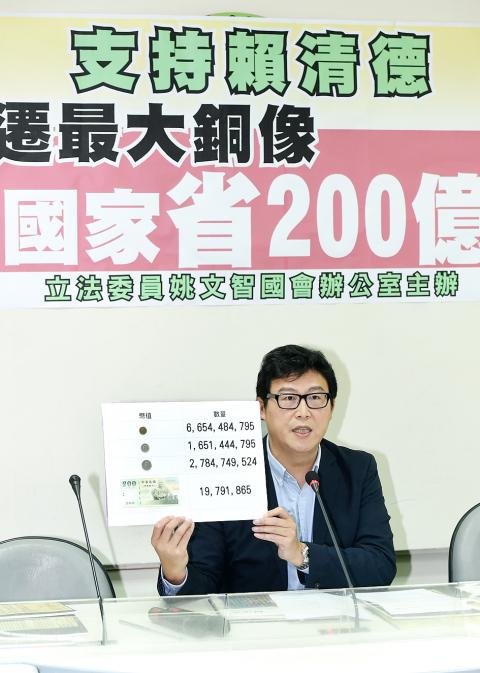The removal of statues of Chiang Kai-shek (蔣介石) from school campuses in Tainan has elicited the Chinese Nationalist Party’s (KMT) ire, but Democratic Progressive Party (DPP) Legislator Pasuya Yao (姚文智) yesterday proposed removing all statues of Chiang nationwide and replacing the former president’s image on coins and the NT$200 bill.
The Tainan City Government took action on Saturday after Tainan Mayor William Lai (賴清德) called for the removal of all statues of Chiang from school campuses in the city.
Following KMT Tainan city councilors’ denunciation yesterday of the removals, the KMT legislative caucus also took Lai to task for “taking down the statues sneakily at night during the weekend,” urging Lai to “stop manufacturing hatred.”

Photo: Lo Pei-der, Taipei Times
KMT deputy caucus whip Liao Kuo-tung (廖國棟) said schools are supposed to be autonomous on this issue and there are different perspectives from which historical figures are assessed.
“History is history; education is education,” Liao said, adding that the educational environment should not be marred by historical controversy.
KMT Legislator Chen Shu-hui (陳淑慧) called Lai’s order to remove the statues without consulting school principals, teachers or parents an “authoritarian” move.
In stark contrast to the KMT, Yao, who also held a press conference yesterday, called for an expansion of Lai’s policy to a complete sweeping away of statues of Chiang nationwide.
Yao showed copies of court verdicts on which Chiang had added his own comments and altered the sentences to executions.
It would be shameful for Taiwan if it did not remove the statues and currency commemorating a dictator, Yao said.
He voiced his support for Lai’s removal of the statues, calling it the beginning of a move to end hatred and proposed moving the largest statue of Chiang in Taipei, the one at the Chiang Kai-shek Memorial Hall, to the Cihu Mausoleum in Taoyuan’s Dasi District (大溪區).
“It’s not like we are throwing it into the ocean; those who wish to pay tribute to him can still visit Cihu,” Yao said, adding that the memorial hall without the statue could be transformed into a branch of the National Palace Museum to help solve the museum’s overcrowding problem.
Yao also proposed having the NT$1, NT$5 and NT$10 coins and the NT$200 bill, which all have an image of Chiang on them, recalled and replaced.
Chiang’s image on the money should be replaced by that of people who would help society better understand Taiwan’s democratic history, such as Chen Cheng-po (陳澄波), a renowned Taiwanese painter executed by the KMT regime in 1947, or Deng Nan-jung (鄭南榕), who in 1989 set himself ablaze to protest against the regime’s repression of freedom of speech, Yao said.
Chuang Chu Yu-nu (莊朱玉女), a woman who sold meals for NT$10 for decades to help low-income families, who passed away earlier this month, would also be an option, Yao said.
A Department of Issuing official at the central bank, who declined to be named, said yesterday that the bank has no comment on the issue.
Additional reporting by Amy Su

Intelligence agents have recorded 510,000 instances of “controversial information” being spread online by the Chinese Communist Party (CCP) so far this year, the National Security Bureau (NSB) said in a report yesterday, as it warned of artificial intelligence (AI) being employed to generate destabilizing misinformation. The bureau submitted a written report to the Legislative Yuan in preparation for National Security Bureau Director-General Tsai Ming-yen’s (蔡明彥) appearance before the Foreign Affairs and National Defense Committee today. The CCP has been using cognitive warfare to divide Taiwanese society by commenting on controversial issues such as Taiwan Semiconductor Manufacturing Co’s (TSMC, 台積電) investments in the

HELPING HAND: The steering committee of the National Stabilization Fund is expected to hold a meeting to discuss how and when to utilize the fund to help buffer the sell-off The TAIEX plunged 2,065.87 points, or 9.7 percent, to close at 19,232.35 yesterday, the highest single-day percentage loss on record, as investors braced for US President Donald Trump’s tariffs after an extended holiday weekend. Amid the pessimistic atmosphere, 945 listed companies led by large-cap stocks — including Taiwan Semiconductor Manufacturing Co (TSMC, 台積電), Hon Hai Precision Industry Co (鴻海精密) and Largan Precision Co (大立光) — fell by the daily maximum of 10 percent at the close, Taiwan Stock Exchange data showed. The number of listed companies ending limit-down set a new record, the exchange said. The TAIEX plunged by daily maxiumu in just

INVESTIGATION: The case is the latest instance of a DPP figure being implicated in an espionage network accused of allegedly leaking information to Chinese intelligence Democratic Progressive Party (DPP) member Ho Jen-chieh (何仁傑) was detained and held incommunicado yesterday on suspicion of spying for China during his tenure as assistant to then-minister of foreign affairs Joseph Wu (吳釗燮). The Taipei District Prosecutors’ Office said Ho was implicated during its investigation into alleged spying activities by former Presidential Office consultant Wu Shang-yu (吳尚雨). Prosecutors said there is reason to believe Ho breached the National Security Act (國家安全法) by leaking classified Ministry of Foreign Affairs information to Chinese intelligence. Following interrogation, prosecutors petitioned the Taipei District Court to detain Ho, citing concerns over potential collusion or tampering of evidence. The

‘COMPREHENSIVE PLAN’: Lin Chia-lung said that the government was ready to talk about a variety of issues, including investment in and purchases from the US The National Stabilization Fund (NSF) yesterday announced that it would step in to staunch stock market losses for the ninth time in the nation’s history. An NSF board meeting, originally scheduled for Monday next week, was moved to yesterday after stocks plummeted in the wake of US President Donald Trump’s announcement of 32 percent tariffs on Taiwan on Wednesday last week. Board members voted to support the stock market with the NT$500 billion (US$15.15 billion) fund, with injections of funds to begin as soon as today. The NSF in 2000 injected NT$120 billion to stabilize stocks, the most ever. The lowest amount it